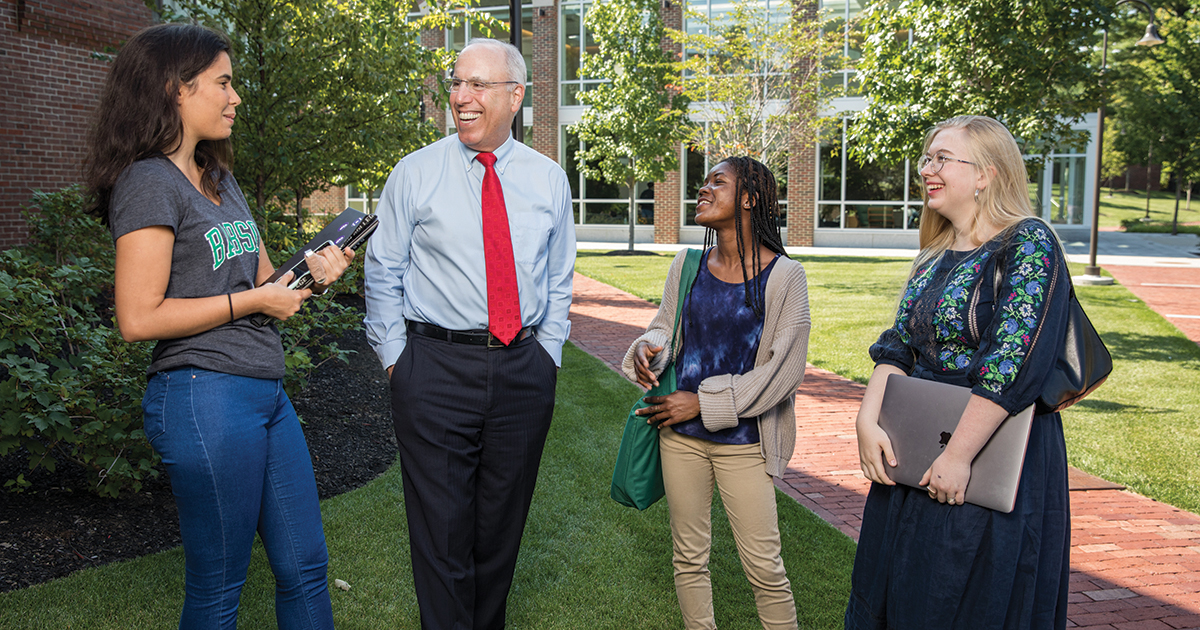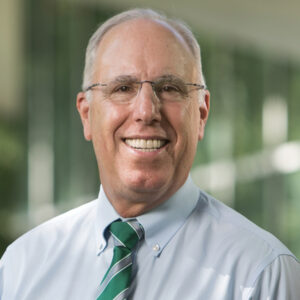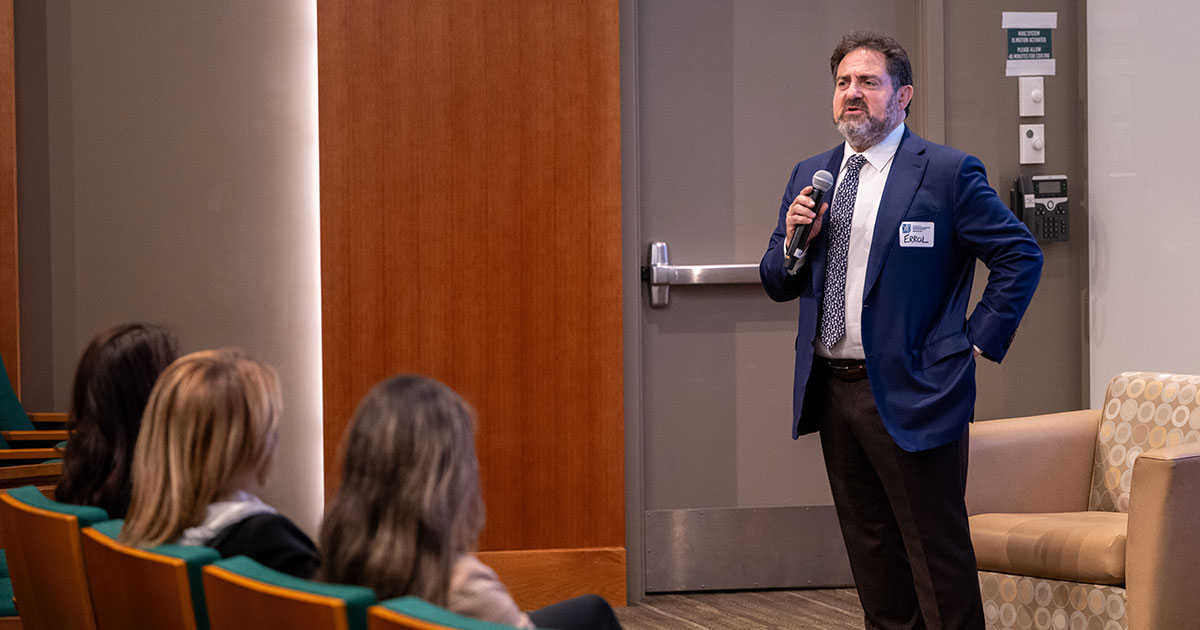‘Greater Impact’: How Babson Is Positioned to Lead

Stephen Spinelli Jr. MBA’92, PhD returned to Babson as its 14th president in 2019, a celebratory time as the College commemorated its Centennial, charting an ambitious course for Babson’s second century. That milestone year culminated with the announcement of the Arthur M. Blank School for Entrepreneurial Leadership, thanks to a transformational $50 million gift from Arthur M. Blank ’63, H’98.
Less than four months later, though, the COVID-19 pandemic hit, putting Spinelli’s new strategic plan, the College, and the world to the test. In the earliest days of navigating that crisis, Spinelli vowed that the pandemic wouldn’t alter the College’s plans but accelerate them. Three years later, the College not only has survived the challenges and uncertainty of the pandemic but also has thrived, positioning Babson for even greater impact amid a volatile higher education market.
Earlier this year, Babson’s Board of Trustees voted unanimously to extend Spinelli’s contract through June 2027. The president recently sat down with Babson Magazine to reflect on his first four years and share his vision for the future.
Q1: Your tenure has been a pivotal period in Babson’s history. Which accomplishments have been the most impactful?

Babson President Stephen Spinelli Jr. MBA’92, PhD (Photo: Jake Belcher)
“We’re doing as well or better than we’ve ever done in the history of the College—the quality, selectivity, and diversity of our student body, the depth and quality of our faculty, the growth of our endowment. The Babson culture is one of continuous improvement, so the Babson education continually improves because of our faculty and our focus on experiential learning. Experiential learning has always been an important part of the Babson education, but it’s becoming more robust and more dynamic than it’s ever been. I’m particularly impressed with how the faculty are integrating it more with the curriculum. We’re also seeing the impact at the Arthur M. Blank School for Entrepreneurial Leadership and specifically the way in which our centers and institutes have become more cross-functional and a hub for collaboration, sharing programs and leveraging resources. Importantly, the Herring Family Entrepreneurial Leadership Village (HELV) is a game-changing asset, taking community living to a new higher ed standard and creating an incredible platform for an entrepreneurship community. Both of these, the Blank School and the HELV, are real competitive advantages that will be difficult for others to replicate.”
Q2: In March 2020, you said the pandemic wouldn’t alter the strategic plan but accelerate it. How did the College advance its plan and position Babson for the future?
“Our record fundraising, including the gift from Arthur Blank, provided an infusion of capital that allowed us to invest. All of the significant gifts—from alumni and others who believe in Babson—allowed us to invest more in the students’ education and experience, as well as award scholarships, recruit faculty, create endowed chairs, and plan the HELV. When others were cautious or contracting, we were expanding, so we lengthened the lead pretty significantly, including the creation of curriculum around leadership and a new concentration in tech entrepreneurship, with more opportunities and capabilities in the works.
Learn more about Babson’s achievements at Meeting the Moment: Collective Impact.
“We also were forced into a more flexible delivery system, developing online and hybrid capabilities that may have taken years to develop. Instead, we did it almost overnight. We have fully embraced a more digitally infused delivery of education, much to the credit of our faculty, IT support, and the entire community.
“We haven’t changed the brand, but we’ve elevated it. We have expanded from focusing on process to focusing on people. We talked about the entrepreneurial process, and now we’ve explicitly added the entrepreneurial leader. When you go from process to people, you expand your vision and include more people. The pandemic reality forced everyone to be more entrepreneurial, and Babson College proved more prepared and more able.”
Q3: Congratulations on your contract extension. What impact do you envision the College making over the next four years?
“The way we think about education is going to change over the next four or five years. Our ability to reach more populations with better education is going to be dramatically increased. Impacting communities is a big concept, and I believe that educational networks to elevate learning across society are going to evolve dramatically. Social networking, commercial networking, and what we’ve learned from the pandemic is going to lead to learning networks. The traction we’re getting, with the Blank School and through strategic affiliations with other institutions, encourages me that an educational network is going to blossom. And, if we’re smart, Babson is positioned to be a core player.”
“Leaving a legacy is getting less important to me, but I do want to add value, and I want the world to be a better place. I can’t imagine having a better vehicle to make a greater impact.”
Stephen Spinelli Jr. MBA’92, PhD
Q4: What motivates you to continue in your role, evolving the strategic plan and elevating Babson College?
“It’s completing the plan. Babson is a unique community, and it’s going to be really interesting to see how it evolves. We’ve achieved great metrics, but we have to continue to bolster a business model that is more sustainable through more strategic alliances and diversified revenue streams. And, we need to evolve in a higher education market that is going through more changes than it has since World War II. Also, it’s an underlying belief in capitalism, in free enterprise, in entrepreneurship, and in education’s role in improving people’s lives. It’s that scaffolding of beliefs that makes Babson so special. We developed a competency in entrepreneurship decades ago, and the world recognizes now that it continually needs more and more of it. So, it feels like a responsibility and a privilege to be in an expansive market with a product or service that the world is demanding. It really is a thrill to be part of it. This is my career capstone. There’s no other job after this. Leaving a legacy is getting less important to me, but I do want to add value, and I want the world to be a better place. I can’t imagine having a better vehicle to make a greater impact.”




